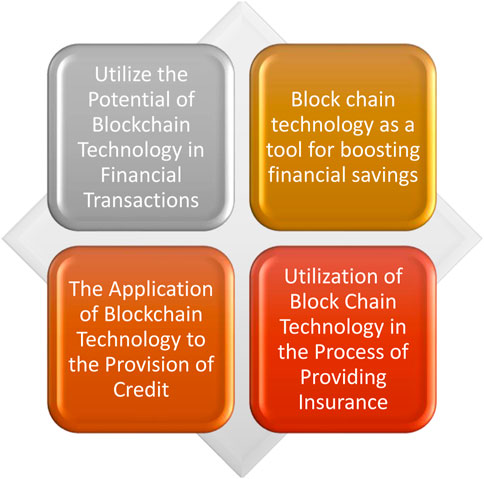Blockchain’s features support sustainability efforts through enhanced transparency, accountability, and traceability, enabling efficient monitoring and management of sustainable practices. Additionally, blockchain’s decentralized nature reduces the need for excessive computing power and energy, aligning with sustainability goals.
How can features of blockchain support sustainability efforts: These features help minimize environmental impact and drive sustainable development in multiple sectors. Blockchain technology offers unique capabilities that can significantly contribute to sustainability efforts. Its decentralized nature enables transparency and accountability while reducing the demand for energy and computing resources.
Table of Contents
This makes blockchain an effective tool for promoting sustainable practices across different industries, including supply chain management, finance, and tourism. By leveraging its features, blockchain can play a crucial role in advancing sustainability and achieving sustainable development goals.

Credit: www.simplilearn.com
Transparency And Traceability
Blockchain technology has the potential to support sustainability efforts by enabling transparency and traceability. It can provide accountability, and cyber-resilience, and increase operational efficiency in global partnerships. With access to data, supply chain information can be used to address social issues, while reducing overall computing power and improving energy footprint.
All things considered, blockchain technology offers secure and sustainable solutions to achieve the goals of sustainable development.
Product Traceability
In today’s global marketplace, consumers are increasingly seeking information about the products they purchase. They want to know where their items come from, how they were produced, and if they align with their values and beliefs. With blockchain technology, product traceability becomes a reality. Blockchain allows every stage of a product’s lifecycle to be digitally recorded and verified. Each step of production, from raw materials to manufacturing to distribution, is transparently documented on an immutable ledger. This ensures that consumers have access to accurate and reliable information about the origins and sustainability of the products they buy.
Supply Chain Transparency
One of the key challenges in sustainability efforts is ensuring supply chain transparency. This is where blockchain truly shines. By leveraging blockchain, companies can provide a verifiable and auditable record of their supply chain activities. Blockchain technology makes it possible to track and verify every transaction and movement of goods within a supply chain. This level of transparency helps identify and address potential environmental, social, and ethical challenges. It allows consumers, investors, and regulators to have confidence in a company’s sustainability claims. Furthermore, blockchain enables the creation of decentralized platforms that connect suppliers, manufacturers, distributors, and consumers directly. This eliminates intermediaries and fosters trust, as all parties can access the same information and have confidence in the integrity of the data. By embracing blockchain technology, companies can not only improve supply chain transparency but also gain a competitive advantage by meeting the growing demands for sustainable and ethically produced products. To summarize, blockchain technology supports sustainability efforts through transparency and traceability. It enables product traceability, allowing consumers to know the origins and sustainability of the products they purchase. It also enhances supply chain transparency, ensuring that companies can provide an auditable record of their supply chain activities. With blockchain, companies can meet the demands for sustainability and gain a competitive edge in the market. Here’s a table summarizing the benefits of blockchain in supporting sustainability efforts:
| Benefit | Description |
|---|---|
| Product Traceability | Allows consumers to know the origins and sustainability of products. |
| Supply Chain Transparency | Enables auditable records of supply chain activities, ensuring ethical and sustainable practices. |
| Decentralized Platforms | Connects all parties involved in the supply chain, fostering trust and eliminating intermediaries. |
All things considered, blockchain has the potential to revolutionize sustainability efforts by providing transparency, traceability, and accountability throughout the supply chain. It empowers consumers to make informed choices and encourages companies to adopt more sustainable and ethical practices. With the implementation of blockchain technology, we can take significant strides towards a more sustainable future. References: – blockchain pr agency imperium comms – blockchain private key QR code – all of the following describe blockchain – how does blockchain support data privacy?

Credit: www.frontiersin.org
Decentralization And Governance
When it comes to sustainability efforts, decentralization, and governance play a crucial role in leveraging the potential of blockchain technology. The decentralized nature of blockchain ensures that power and decision-making are distributed among network participants, leading to a more robust and transparent governance model. Let’s explore how blockchain supports sustainability through decentralized energy systems and community-based initiatives.
Decentralized Energy Systems
Blockchain technology facilitates the development of decentralized energy systems by enabling peer-to-peer energy trading and management. Through blockchain-enabled microgrids, energy consumers can directly engage in the buying and selling of excess renewable energy, reducing dependency on centralized power grids and promoting renewable energy usage. Additionally, blockchain supports the creation of transparent and auditable energy consumption records, fostering accountability and efficiency in energy usage.
Community-based Sustainability Initiatives
Community-based sustainability initiatives are empowered by blockchain through the establishment of transparent and immutable systems for governance. Blockchain enables the creation of decentralized autonomous organizations (DAOs) that allow community members to participate in decision-making processes related to sustainability projects. Moreover, blockchain ensures the secure and transparent allocation of resources, incentivizing active community involvement and fostering trust in sustainability efforts.
Smart Contracts And Tokenization
In the realm of sustainability, the implementation of smart contracts and tokenization through blockchain technology opens up a world of possibilities. Let’s delve into how these features of blockchain support sustainability efforts:
Automated Incentivization Mechanisms
Smart contracts within blockchain technology enable automated incentivization mechanisms, which can revolutionize sustainable initiatives. These contracts are self-executing, with the terms of the agreement directly written into the code. By leveraging smart contracts, organizations can seamlessly automate rewards for environmentally friendly actions, fostering a culture of sustainability and conservation.
Carbon Credit Tokenization
Tokenization, a feature of blockchain, allows for the representation of real-world assets such as carbon credits as digital tokens. Through this process, carbon credit tokenization ensures transparent and efficient trading and management of carbon credits, facilitating more accurate and accessible tracking of emissions reduction efforts. By enabling the seamless transfer and verification of carbon credits, blockchain technology plays a pivotal role in supporting sustainability initiatives focused on mitigating climate change.
.png)
Credit: www.metawealth.co
Data Management And Trust
Blockchain technology can support sustainability efforts through its features such as transparency, traceability, and accountability. It can improve data management and trust by providing secure and decentralized platforms for recording transactions. This can help companies reduce their computing power and energy footprint, while also promoting transparency in supply chain data and addressing social issues.
Secure And Immutable Data For Sustainability Reporting
One of the key features of blockchain that supports sustainability efforts is its ability to provide secure and immutable data for sustainability reporting. When it comes to sustainability, it is crucial for organizations to accurately report their impact on the environment and society. With traditional data management systems, there is always a risk of data manipulation or tampering, which can undermine the credibility of sustainability reports. However, blockchain technology offers a solution by ensuring the integrity and transparency of data.
Blockchain is a decentralized and distributed ledger that records transactions in a transparent and secure manner. Each transaction is stored in a block that is linked to the previous block using cryptographic principles, forming an unalterable chain of data. Every participant in the blockchain network has a copy of the entire ledger, which makes it nearly impossible for any single entity to manipulate the data without consensus from other participants. This feature ensures the authenticity and immutability of sustainability data, providing stakeholders with confidence in the accuracy of sustainability reports.
Enhanced Trust In Sustainability Claims
In addition to secure and immutable data, blockchain technology also enhances trust in sustainability claims. Trust is a crucial factor for organizations striving to establish themselves as sustainable and responsible entities. Consumers, investors, and other stakeholders are increasingly demanding transparency and accountability in sustainability practices. Blockchain technology can play a key role in meeting these expectations.
The decentralized nature of blockchain allows for increased transparency and traceability in supply chains, which are essential for verifying sustainability claims. By recording every transaction and movement of goods on the blockchain, companies can provide a comprehensive audit trail, showing the journey of products from raw materials to end-users. This level of transparency helps to ensure that sustainability claims are not just words, but backed up by tangible evidence.
Moreover, blockchain technology also enables the creation of smart contracts, which are self-executing agreements that automatically trigger actions based on predefined conditions. Smart contracts can be utilized to enforce sustainability commitments and hold parties accountable. For example, a company can create a smart contract with its suppliers, stipulating that they must adhere to certain sustainability standards. If the suppliers fail to meet these standards, the smart contract can automatically penalize them or terminate the business relationship.
In conclusion, blockchain technology provides robust data management and enhanced trust for sustainability efforts. The secure and immutable nature of blockchain helps ensure accurate sustainability reporting, while increased transparency and traceability build trust in sustainability claims. By leveraging blockchain’s features, organizations can strengthen their sustainability initiatives and demonstrate their commitment to a more sustainable future.
Frequently Asked Questions Of How Can Features Of Blockchain Support Sustainability Efforts
How Can Blockchain Be Used To Support Sustainable Practices?
Blockchain can support sustainable practices by enabling accountability, transparency, and traceability. It can reduce computing power and improve energy footprint. Additionally, blockchain provides access to data that can improve marketing and supply chain transparency into social issues.
How Blockchain Can Help In Supply Chain Sustainability?
Blockchain can help supply chain sustainability by providing transparency and traceability for ethical sourcing and reducing the environmental footprint. It also streamlines data sharing and reduces operational costs. Blockchain’s decentralized and secure nature supports sustainable practices in the supply chain.
How does Blockchain help With Sustainable Project Management?
Blockchain enables transparency, traceability, and accountability for sustainable project management, increasing operational efficiency and reducing energy footprint. It provides access to data for marketing improvement, reduces computing power, and offers supply chain transparency. Blockchain is a key technology in achieving Sustainable Development Goals.
What Is The Role Of Blockchain In Sustainable Development?
Blockchain technology supports sustainable development by enabling accountability, transparency, traceability, and cyber-resilience. It can also increase operational efficiency and reduce computing power and energy consumption. Supply chain data on the blockchain can provide transparency into social issues, while access to data can improve marketing and reduce costs.
All things considered, blockchain technology has the potential to enhance sustainable practices in different sectors, such as supply chain management, tourism, finance, and financial inclusion.
Conclusion
The features of blockchain have the potential to greatly support sustainability efforts. Through its decentralized and distributed nature, blockchain can enable accountability, transparency, and traceability in multiple sectors, including supply chain management, finance, and tourism. This technology can reduce computing power, improve energy footprint, and provide transparency into social issues.
Furthermore, with its features of transparency, efficiency, and trustworthiness, blockchain can drive sustainable practices and enhance global partnerships. By harnessing the power of blockchain, we can move closer to achieving the Sustainable Development Goals and creating a more sustainable future for all.

